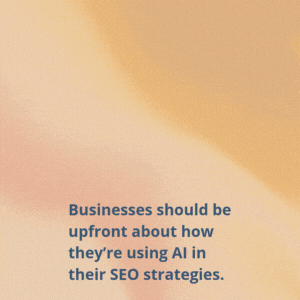AI is transforming the SEO landscape at lightning speed, but with this surge of innovation comes a new dilemma: how do we harness its power responsibly? From automating content creation to supercharging keyword strategies, AI tools are rewriting the rules of optimization. Yet, beneath the surface, ethical concerns are brewing. Are we unintentionally introducing bias? Is user privacy at risk? In this article, we’ll explore five critical ethical challenges shaping the future of AI in SEO—where the pursuit of progress must be balanced with fairness, transparency, and human oversight.
Bias and Fairness
One of the biggest concerns with using AI in SEO is the risk of bias. AI learns from data, but if the data itself is biased, the results will be too. For example, an AI tool trained on data favoring certain regions, languages, or demographics might unintentionally prioritize one group over others when ranking content.This isn’t new or limited to AI, in fact Google’s search algorithm has been accused of bias for decades.
The solution? Be mindful of the data we feed into these systems and regularly check for bias. The goal is to ensure that AI doesn’t unfairly tip the scales but instead helps create a more inclusive and equitable online space for everyone.
Transparency and Accountability
AI can sometimes feel like a “black box” – it makes decisions, but we don’t always know how. This lack of transparency can lead to shady practices, like manipulating search results behind the scenes.
To keep things ethical, businesses should be upfront about how they’re using AI in their SEO strategies. Let people know when AI is at play in content ranking or analysis, and take responsibility for the outcomes. Clear communication helps build trust and keeps companies accountable for their AI-driven decisions.
Privacy and Data Security
When using AI for SEO, there’s a lot of information being collected and analyzed, which raises some big questions around privacy and security. Sure, personalized content is great, but not at the expense of user privacy.
Companies need to be smart about how they handle user data, ensuring it’s protected, anonymized when possible, and in compliance with privacy laws like GDPR. Being transparent about what data is collected and how it’s used is key to maintaining trust and keeping things ethical.
Human vs. AI
As AI becomes more capable, there’s always that lingering question: Will AI eventually take over SEO jobs? While AI can definitely handle a lot of tasks – like optimizing metadata, generating content, or analyzing trends – it’s not about replacing humans entirely. AI might be fast, but it lacks the creativity, empathy, and strategic thinking that human marketers bring to the table.
The best SEO strategies will be a mix of both. AI handles the heavy lifting, automating repetitive tasks and crunching numbers, while humans focus on the creative and ethical decision-making that requires a more nuanced touch. It’s about working together, not competing.
AI is changing the SEO game, no doubt about it. But with all the advantages come ethical responsibilities. Whether it’s tackling bias, ensuring transparency, safeguarding privacy, or finding the right balance between humans and AI, these challenges are worth addressing. By staying aware and committed to using AI responsibly, businesses can build trust and improve their SEO strategies for the long haul.
Maximize Online Visibility with Ethical SEO Solutions
Mad Fish Digital provides expert SEO strategy and marketing services, combining cutting-edge techniques with responsible practices. Boost your online presence and reputation. Schedule a consultation today.

